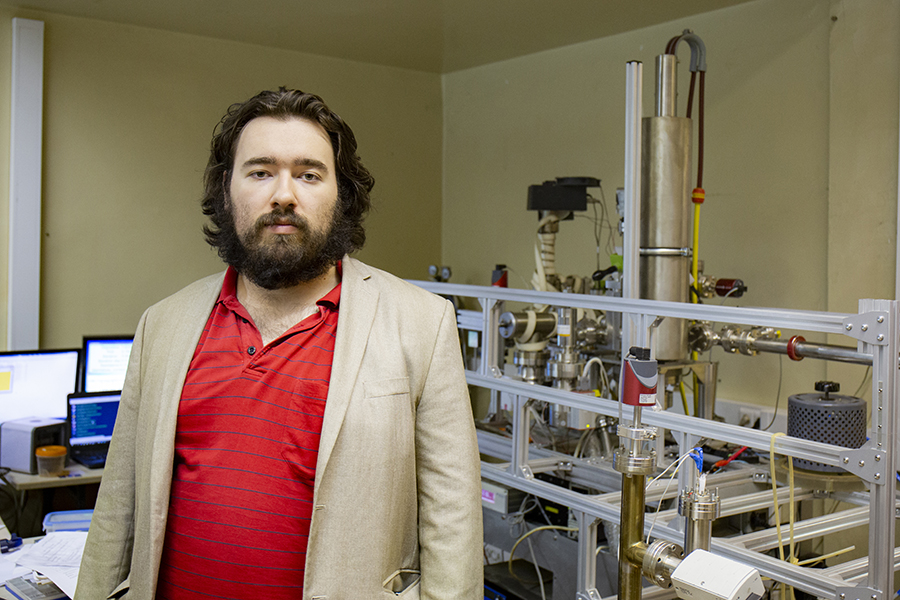Most recently, the Russian Science Foundation has announced the results of the 2018 competition for grants within the event "Conducting initiative research by young scientists" of the Presidential program of research projects implemented by leading scientists, including young one.
The competition is intended for researchers and candidates of science under the age of 33 years, working in leading research institutes and universities of Russia, who on their own initiative, alone or with the support of a group of students or graduate students, implement a research project.
MEPhI was supported in 7 projects, among which 5 belongs to young scientists of the LaPlas Institute.
The laureate of the competition, young scientist of the Department of plasma physics at the Laplas Institute of MEPhI Stepan Krat told why he decided to devote himself to science and what makes a scientist’s life attractive.

– Tell us about your project.
– The theme of my project is “Methods of diagnosis of lithium coatings on different substrates”. Broadly speaking, the lithium is a very an important material in solving the problem of controlled thermonuclear fusion – the energy of the future, so it is necessary to conduct a lot of research related to it.
Any study requires method of diagnostics. For example, in order to know what the weight of the object is, it is necessary to develop scales, and in the case when it's impossible, you should think of a way how to measure the mass of the object by indirect methods. Just like here. It is necessary to develop methods for diagnosing lithium coatings (composition, thickness and other parameters). This is not so easy, given the chemical activity of lithium, small atomic number and its other features. I suggested several potential methods of lithium coatings diagnostics, this topic caught an interest of the contest experts, and they allocated funds to continue the development.
– How will the results of the project help in solving the problem of controlled thermonuclear fusion?
– My project relates to the development of measuring instruments, so the scope of its application in solving the problem can be quite broad. I cannot say how big my contribution will be, but the significance of my work is beyond doubt for me and for colleagues around the world.
– What can you advise to a young scientist who is going to take part in such a competition for the first time? Is there a certain algorithm of actions that increases the chances of winning?
– Of course, such an algorithm exists. First, you need to know the evaluation criteria. They are well known in the scientific community. In particular, you need not only to have a good idea of the project, but also to competently register it, and start writing an application not a week before the competition, but much earlier (a few months). Secondly, the scientific reserve is necessary. Thirdly, you need to be an attractive candidate in the eyes of the scientific fund: to have publications in reputable scientific journals. Here I strongly advise you to be published in journals with an impact factor of more than one. It is also necessary to have a certain portfolio, and it is possible to gain it, directing scientific projects of school students, theses of students. Do not forget that projects with great economic prospects are quoted above.
– Why did you choose the path of a scientist?
– It is difficult to say, it was a progressive process. The first such thoughts I had in the 5th grade, I've always been a techie. The final decision I made when I studied at the Pre-university of MEPhI, that's when I had my first scientific works. But beyond my natural predisposition, I've always been driven by scientific altruism. There are always enthusiasts who will move science forward.
– What is interesting in the life of a young scientist?
– I can say that science that my colleagues and I are engaged in is a fundamental good that works for the benefit of the whole mankind. In addition, there are no typical tasks in search fundamental science. Yes, we stand on the shoulders of giants, yes, we develop existing topics, but each new problem requires solutions that did not exist before, so the routine does not threaten us. The third plus stems from the first two – I do not regard my work as a certain duty, for me it is a paid hobby.
– A lot of guys, particularly younger students and applicants, choose a path to science for themselves. What can you advise them so that to succeed in this difficult field?
– You should always start small. At MEPhI, many research groups are happy to welcome interested students, regardless of their course and level of training. First of all, I advise you to find an interesting and active scientific group. After that, it is necessary to obtain basic practical engineering skills on the basis of the scientific group, namely to learn how to make drawings, solder boards, master the basics of programming, etc. Try to learn as much practical and engineering skills as possible, skills that will be useful to you in the future, and only then you can start to be engaged in theory and research.





